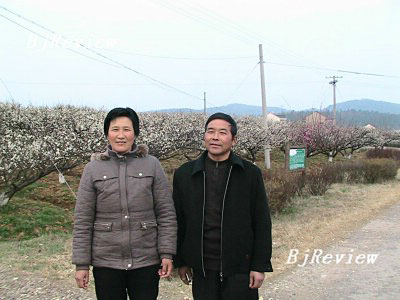
UPPER RURAL CLASS: Yu Lasheng and his wife epitomize wealthy Chinese farmers
How much can a rural Chinese guy's fortune change in two years? Well, Yu Lasheng successfully face-lifted into a rich dad from a poor dad. In 2006, Yu made a rural fortune of over 100,000 yuan with his small village restaurant and 0.26 hectares of land.
In 2004, the annual income of Yu's family of four lingered around 25,000 yuan. While this amount of money could help make ends meet for them, luxurious items such as air-conditioners and computers were still castles in the air.
Not anymore.
Yu now has a two-story home fit for a rural king, with all the city-dwelling accoutrements one could desire.
His story illustrates a major insight into China's development: The gap between the rich and the poor doesn't only exist within cities or between cities and the countryside. It also exists between rural areas themselves. And while the gap between the rich and the poor is usually cast in a negative light, this one offers hope, because it suggests the government's talk about developing the countryside isn't just hype. It can happen, although there's a long way to go to spread the wealth and security.
From rags to riches
Yu, who is in his 50s, is dark-skinned, introverted, and looks like a typical Chinese farmer.
But when he started to talk, he sounded as witty as any urban dweller.
Yu is the father of two daughters, aged 25 and 16. He is a farmer in southeast China's Fujiabian Village of Jiangsu Province, which boasts strong economic performance.
Instead of making a fortune outside town, Yu found his "American dream" come true right in the small village where his ancestors lived for centuries.
Before 1998, Yu and his family lived in one room with a tile roof. They had another room to keep pigs. Their total income was from the one-quarter-hectare of land where they grew rice and vegetables. At that time, they relied heavily on the weather and the average annual income remained around 25,000 yuan. If there was a major flood or drought in one year, the whole family would have to suffer huge losses. Meanwhile, Yu's two daughters were going to school and education was another big expense.
While Yu was wondering how to earn more to live a better life, leaders of his village were thinking the same.
With support from the local government, Fujiabian Agricultural Technology Park (The Park) was established in 1994. The Park has been managing to introduce advanced science and technology and refined seeds from outside to develop local agriculture. Farmers were taught to grow economic plants such as strawberries, blackberries, and pear and apple trees. They explored deserted land and formed large-scale development projects.
In six years, the village was transformed into a brand new one. In 1998, Yu spent all his savings and built a two-story house.
The beautiful scenery of Fujiabian attracted many city residents who would drive all the way there for holiday relaxation. Yu quickly sensed the potential consumption power from those rich city travelers and turned his two-story house into a restaurant in 2004.
"They [the travelers] can have lunch at my restaurant when they are hungry and can take a nap when they are tired," said Yu, adding that many other villagers are doing the same business.
In 2005, the net income brought about by the restaurant and his original one-quarter- hectare of land reached 50,000 yuan, doubling that of any previous year. Last year, Yu and his family's income soared to 100,000 yuan. "My restaurant is growing 40-50 percent each year," Yu said confidently.
In 2005, the Central Government ordered the removal of agricultural tax upon farmers and Yu benefited.
"For my one-quarter-hectare of land, the agricultural tax was 500 yuan," Yu told Beijing Review. "Though it is not a big sum of money, it shows that our government starts to pay attention to us and we are very much encouraged."
In eastern coastal provinces, farmers are not only exempt from agricultural tax, but can also get a farming subsidy. In Fujiabian, farmers can get 750 yuan for one hectare.
The emerging prosperity of Fujiabian, bolstered by government support, has even begun to cause a chasm in fortune within the same young generation.
"My older daughter was not as lucky as my younger daughter," Yu sighed. When his family was poor, they could not afford two daughters both going to school. So Yu Juan, the older daughter, quit after finishing junior middle school studies.
"You can't always imagine what will happen in two years," said Yu. In 2005, in an effort to build a socialist countryside, the government called off incidental fees for education to ease the burden on farmers.
